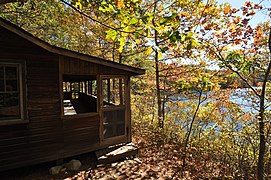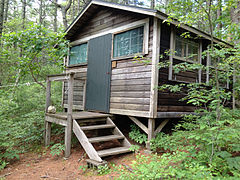Pinewoods Camp
History
Initially known as "Pine Tree Camp", Pinewoods was founded in 1919 by Helen Osborne Storrow as the first National Girl Scout Leadership Training School. In 1933, the facility was converted for use as a dance camp. The name was changed to Pinewoods Camp in 1935. Storrow died in 1944, and left the property to Lily and Rick Conant, who operated the property until 1976. At that time, the Conants transferred its ownership to a newly created nonprofit organization, Pinewoods Camp, Inc., that now runs the facility. Pinewoods was added to the National Register of Historic Places in 2009.
Activities

Each summer, Pinewoods Camp hosts over a dozen sessions, some of which are a week long, and others of which take place over a weekend. Each session features music and dancing educational programs for adults and is run by one of five Program Providers:
- The Country Dance and Song Society
- The Country Dance Society, Boston Centre
- The Folk Arts Center of New England
- The Folk Music Society of New York
- Royal Scottish Country Dance Society, Boston Branch
Pinewoods has played a central role in the development of country dance traditions in the United States.
Grounds and facilities
Pinewoods's facilities include four open-sided dance pavilions (Hands Across, Pine Hollow, Ampleforth and Newbiggin), a dining hall and kitchen, a camp house, and rustic cabins for up to 140 campers (plus offices, staff housing, and support facilities). Three of the pavilions and the dining hall were renovated as part of a recent capital campaign and are handicapped accessible, although some other facilities are not.
- Pinewoods grounds
-
Hunsdon House, a house with several rooms for campers
-
Nonesuch, a cabin on the shore of Round Pond
-
Lads 2, a two-person cabin
-
Dining hall and kitchen
-
Serving area in dining hall
-
Ducks invade the swimming area on Long Pond
-
Sunset on Long Pond
See also
Notes
- ^ "Hands Across" and "Pine Hollow" were originally named "C#" and "C# Minor" respectively, references to Cecil Sharp. In 2023, the names were changed due to concerns about Sharp's legacy.
References
- ^ "National Register Information System". National Register of Historic Places. National Park Service. July 9, 2010.
- ^ Dunavin, Davis (November 4, 2021). "Folk Songs: A folk dancing camp for the people". WSHU. Retrieved November 27, 2021.
- ^ "NRHP nomination for Pinewoods Camp". Commonwealth of Massachusetts. Retrieved May 23, 2014.
- ^ "History". Pinewoods. Pinewoods Camp, Inc. Retrieved June 19, 2020.
- ^ "Pinewoods Camp Collection, 1907-2008". University of New Hampshire Library. University of New Hampshire. April 23, 2014.
- ^ Country Dance and Song Society
- ^ Country Dance Society, Boston Centre
- ^ Folk Arts Center of New England
- ^ Folk Music Society of New York
- ^ Royal Scottish Country Dance Society
- ^ Walkowitz, Daniel J. (2010). City Folk: English Country Dance and the Politics of the Folk in Modern America. New York: New York University Press. p. 188. ISBN 978-0-8147-9475-3.
- ^ Smith, Stephanie. "City Folk: A Narrative of Creating Community in American through English Country Dance (film presentation)". Dance, Narrative, Heritage: 28th Symposium of the ICTM Study Group on Ethnochoreology 2014. Zagreb, Croatia: Institute of Ethnology and Folklore Research.
- ^ Board of Directors (February 7, 2023). "New Names for Two Pavilions". Pinewoods Camp. Retrieved June 20, 2023.
- ^ Board of Directors (March 23, 2022). "Announcement to our Community". Pinewoods Camp. Retrieved June 20, 2023.







